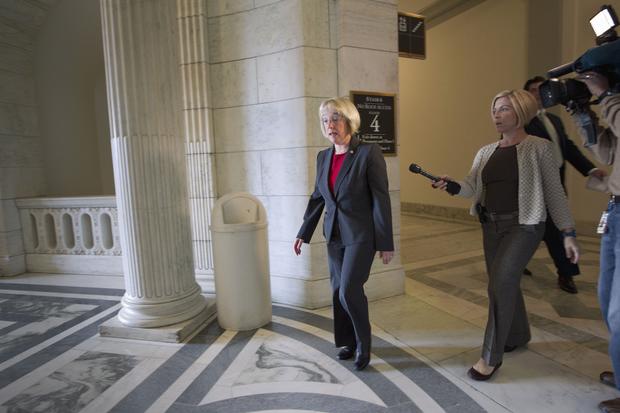Despite pessimism, supercommittee members make last-ditch effort at deal
Updated: 3:32 p.m. ET
Amid widespread pessimism over the congressional supercommittee's prospects of reaching an agreement to reduce the deficit, Sen. John Kerry on Monday offered up a new proposal that would include a trillion-dollar revenue increase, a Republican leadership aide tells CBS News, although there is no indication that other Democrats on the committee are behind that proposal.
A majority of the committee members met Monday in last-ditch talks aimed at coming to an eleventh-hour compromise, even while aides said they were skeptical that a deal could be made in such short a time.
In an interview with CBS News, Kerry would not comment on the alleged proposal but emphasized that "we're really under a gun" to come to a solution.
"I think it's pretty imperative to get done what we -- I think there's a time limit on us that's coming down to hours because there has to be a filing 48 hours ahead of time so we're really under a gun," he said.
"We are just having a continued discussion - in good faith I hope," Kerry added, speaking to reporters as he returned to his office.
Meanwhile, Patty Murray, Democratic co-chair of the supercommittee, told reporters the committee was "still working" as she joined the bipartisan meeting of committee members in fellow Democratic Sen. John Kerry's office Monday afternoon.
Supercommittee failure gives both sides what they wantStill, one Democratic aide with knowledge of discussions said there was "no sense of progress" despite the continued negotiations.
"Though talks continue, there is no sense of progress," the aide said. "The Republicans are simply not budging and this appears to be going nowhere."
Technically, the 12-person bipartisan group of lawmakers has until Wednesday at midnight to reach an agreement for reducing the deficit by $1.2 trillion, as was tasked to them as part of Congress's August deal to raise the debt limit. But the members are legally required to make their plan public at least 48 hours before voting on it -- which means that the committee must come to a deal by Monday night.
Murray, along with Sen. Jon Kyl, R-Ariz., Rep. Fred Upton, R-Mich., Sen. Max Baucus, D-Mont., Sen. John Kerry, D-Mass., Sen. Rob Portman, R-Ohio, and Rep. Chris Van Hollen, D-Md., are among the seven members who have convened in Kerry's personal office for the meeting, which started at about late morning Monday.
If no deal is reached, $1.2 trillion is set to be automatically cut from areas like Medicare and national security in 2013 - an alternative which was designed to serve as an incentive for compromise, and which both parties say they want to avoid.
Sen. Baucus, as he joined the group at around 12:30 p.m. told reporters "there's always hope" with regards to a deal.
"We're having last-minute discussions," Van Hollen told CBS News, adding that there could be more meetings throughout the day.
Still, pessimism continues to pervade talk surrounding the negotiations, and lawmakers on both sides of the aisle pointed fingers Monday for what is increasingly being seen as a disastrous congressional experiment.
Republicans on Monday decried what they described as President Obama's limited involvement in the negotiations and the Democrats' insistence on raising taxes. Democrats, meanwhile, pointed to the GOP's refusal to raise taxes as a sign that the party is beholden to anti-tax activist Grover Norquist.
In a press briefing Monday, White House Press Secretary Jay Carney deflected criticism that the president was insufficiently involved in the negotiations, noting that while the president put forth a blueprint for a deficit reduction plan, "there wasn't a seat at that table, that I'm aware of, for a member of the administration."
"We were all fall in contact with members of Congress through various liaisons here at the White House, contact with members of the committee," Carney told reporters. "But let's be clear about it: Congress assigned itself a job; assigned 12 of its own members a task -- a task that wasn't really that difficult to achieve if there was a willingness to compromise; if there was a willingness to take a balanced approach, an approach that is supported by a majority of the American people. Congress needs to meet its responsibilities."
He urged Congress to continue to work on a plan rather than preemptively assigning blame for the committee's failure.
"This committee was established by an act of Congress. It was comprised of members of Congress. Instead of pointing fingers and playing the blame game, Congress should act, fulfill its responsibility," Carney said.
And while Carney admitted that the committee's failure to reach a deal would result in cuts to the defense budget that are "much deeper than we think are wise," he declined to suggest that the White House might reverse the so-called sequester.
Congress "needs to hold itself to account," he said. "And also should not then try to undo the consequences of their own failure, the consequences that they themselves passed into law. They should do the right thing and come together."

